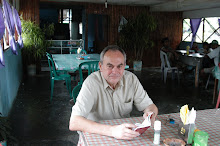We've been offline for several days, up among the volcanos of the Cordillera de Guanacaste, great time, but poor or no net connection. More about that tomorrow - first Ros's description of a trip she had while we were on the Caribbean coast in Tortuguero:
"We’d seen Josh
around Casa Marbella in his khaki
shorts, T-shirt and cap; slow talking with a round Canadian drawl, bleary-eyed,
his greying hair tied back in a long thin pigtail. He turned up a few minutes
late and looking somewhat the worse for wear to guide us through the rain
forest on Turtle Hill – a rounded high promontory at the mouth of the Tortuguero
River. The river taxi had room for seven passengers, but there were only four
of us – Josh, a newly-wed French couple and me. We zip along the broad channel,
the fancy lodges lining the banks with their parrot tablecloths flapping in the
breeze. Guido grounds the flattened prow on the beach and we hop ashore,
waiting for the ebb so the water doesn’t pour into our rubber boots.
We plod
across the sandy beach and Josh points out the seed pods in the swash zone –
large round pods the size of golf balls, flattened rounded disks and coconuts –
all are far too large to be carried by birds or other animals and depend on
water for their distribution. We pass by a cheap and cheerful row of wooden bungalows
and cafes lining the beach and into the rainforest beyond. Suddenly it’s dark
and dank, the cries of children playing on the beach absorbed by the foliage.
There are 409 species of tree in this forest, four times as many as in all of North America and Europe. All are struggling
for survival, filling a niche in this complex ecosystem, all striving to reach
the light. The trees thrive with their roots in the wet nutrient poor soil, but
many other life forms struggle to stay dry. The white tent bats chew along the
main longitudinal vein of a palm leaf so that it folds, forming a waterproof
roof; they cluster beneath this during the day. Termites build their nests high
up in the trees here.
The trail
is muddy and slippery with brown decaying leaves. Occasionally we spot a tiny,
bright red poison dart frog – the mucus on their backs is not poisonous to
touch unless you have an open cut. Bullet ants can give you a nasty bite
though, so I stay well clear. And I carefully avoid touching a vicious looking
plant with spikes covering its stems and leaves, which can make you sick for
days.
We hear a
rustling in the tree tops and suddenly it’s pouring down; we hurriedly slip
into our ponchos. I’m lucky, mine has a hood and it covers my backpack and
hangs down to my knees; the others are drenched in minutes. The treetops way
above us sway violently and Josh decides that we should retreat – falling
branches are dangerous. We seek refuge in the nearest bar on the beach, Josh
swigging his tumblers of white rum and water. I watch the kids splashing on the
beach, the waves crashing onto the barrier bar just across the channel, and the
brown pelicans effortlessly hugging the swell.
Soon Guido
is here to fetch us and we drone back to the dock at Casa Marbella. Josh steps unsteadily up onto the prow and then
onto the dock, his foot slips on the wood slick with algae and he falls
headfirst, backpack and all, into the brown muddy river water. He comes up
looking disheveled and surprised and Guido helps him clamber back onto the dock.
This is not the first time, and it won’t be the last…. "


Ingen kommentarer:
Legg inn en kommentar